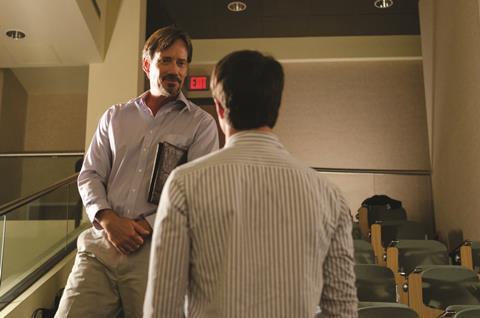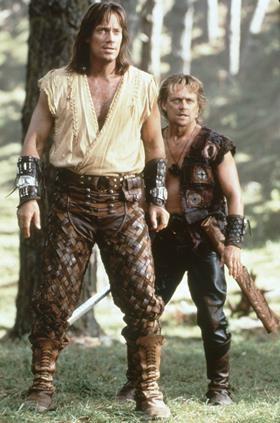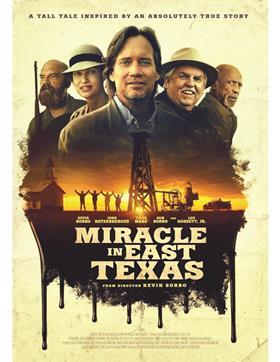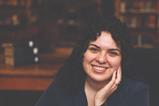The God’s Not Dead actor on being cancelled by Hollywood, the stroke that nearly ended his career and why he won’t stop being outspoken on social media, no matter how much trouble it gets him in
It would be easy to stereotype Kevin Sorbo. If you were to form an opinion based solely on his social media posts, you’d quickly peg him as a vocal American conservative who takes delight in airing views that range from the contentious to the conspiratorial.
The 65-year-old actor first shot to fame playing Hercules in the hit 90s TV show of the same name. In more recent years he’s become best known to Christian audiences for his role as the angry atheist professor in the 2014 megahit God’s Not Dead.
Sorbo is a complicated product of his Lutheran upbringing. He says he’s never wandered away from the faith, despite doing “a lot of dumb things as a teenager”, yet he casually mentions the Bible may not be “100 per cent accurate” – a statement that would surely place him at odds with most evangelicals.
He’s adamant that Hollywood has turned its back on him due to his “conservative and Christian views”. It’s why he founded his own production company, Sorbo Studios, which aims to “breathe traditional values and uplifting content back into the fabric of American culture”. Their latest offering, Miracle in East Texas is a feel-good tale based on the true story of two conmen and the biggest oil strike in American history. But he’s upfront enough to admit not all of his movies have worked. “About a dozen of them absolutely suck!” he tells me when we speak.
Intriguingly, Sorbo hasn’t completely abandoned secular filmmaking in order to focus on Christian films. He’s currently working on a comedy-zombie movie, for example. When I quiz him on the apparent contradiction between his faith and his films, he seems nonplussed. “It’s just fun,” he says of another upcoming role as a vampire. “Besides, I don’t claim to be perfect.”
Hollywood are hypocrites. It’s all a one-way street with these guys
During the height of the pandemic, Sorbo was temporarily banned from Facebook for allegedly spreading Covid misinformation. He’s highly sceptical of the vaccine, and his posts on Twitter/X are regularly incendiary. One recent message read: “I’m disappointed knowing how so many on the left would have complied and even aided the Germans in WW2.”
When I challenge some of his more outrageous comments, such as his view that America’s “liberal left” want an “all-female army”, he suggests I shouldn’t take his tweets so seriously, claiming he was “just being sarcastic”. But it begs the question: if he hates being cancelled so much, why carry on poking the bear, especially if it’s only in jest?
Sorbo’s faith helped get him through a series of strokes that not only threatened to end his career but his life as well. It’s a heart-warming tale that could easily be missed among the bluster and swagger of his more reactionary remarks and, by the end of the interview, I find myself still struggling to get a handle on why he insists on being so provocative. Does it come from a place of strong belief in the right to free speech? Are these dearly held opinions, or just unfiltered thoughts? It’s just another of the inherent contradictions that make Sorbo so difficult to pin down.

You made a name for yourself in Hollywood through TV shows such as Hercules, but you’ve since gone your own way. Why is that?
Hollywood booted me out about ten years ago. My agent and manager said: “We can’t work with you anymore because of your conservative and Christian views.” I said: “But you’re the industry screaming for tolerance!” Hollywood are hypocrites. It’s all a one-way street with these guys. I formed Sorbo Studios because I thought: I love the industry. I love the creative process. I love working people on both sides of the camera. I’ve shot over 60 movies since I left Hollywood. Not all of them are good. About a dozen of them absolutely suck. But I’ve been very busy doing that.
In God’s Not Dead, you played a God-hating philosophy professor. That film was a huge success, and changed the public perception of Christian films. Did you have any inkling it was going to get so much attention?
Well, we knew we had a good script. We had a very low budget. We shot the whole thing for $2m, which is probably less than the catering budget on Pirates of the Caribbean! We thought it could make up to $10m in theatres. It went on to make $140m worldwide. But we could not get on mainstream talk shows in America because it had God in it. It’s so weird to me. I always joke that if I played a paedophile Islamic radical terrorist, I would probably win an Oscar.

Do you think Christian movies are more accepted now?
Well, I know that Christian movies are getting more and more popular. The production value on them is great. The writing is great. They’re not cheesy like they were 25 years ago. There’s a huge niche market out there that people aren’t paying attention to – although I hate saying ‘niche’ because America was founded on Judeo-Christian values, but I think we’re pretty much 50 per cent secular as a country now. There’s 80m homes out there that want the kind of movies we make. So we’re gonna keep making things.
What kind of films are you most drawn to? Are you looking for themes of faith and redemption?
I think a lot of [people are] looking for a little hope because of all the stuff that’s going on in the world right now, and families breaking apart. As much as I love going to see another Thor movie, when 80 per cent of it is just like watching the video game because it’s all visual effects, I do think people still want a good story.
I wanted to be an actor because of movies that deal with relationships and real life. That’s what I saw in all these old black and white movies that my mum used to watch. But all Hollywood wants to do now is things like Pirates of the Caribbean 12, you know, just keep rehashing the same stuff. Or they want to take old classics and just redo it with a different, diverse cast – which is fine, but it’s like: Why can’t you use that same type of cast in something more original? To me it’s just lazy.
In an ideal world, would you prefer to still be making mainstream films in Hollywood, rather than being forced to re-route your career into making Christian films?
Well, it’s not like every movie I do is a faith-based movie.
I’ve done a lot of secular movies. I’ve got a comedy zombie movie in post-production right now. And another one where I play a 700-year-old vampire.
God never promised an easy life to any of us
People might be surprised to hear a conservative evangelical Christian is making those kinds of films…
It’s just fun for me. But I don’t claim to be perfect.
I remember going on a talk show, and there was a guy backstage with me who was a Christian. He said: “You’ve got a lot of influence, you’ve got to be very careful what you do with your life. If you do one thing and screw up, you’re not gonna be forgiven.” And I said: “Really?” That’s just amazing to me, because all of us make mistakes. Being a Christian is just having faith in Jesus. Is mankind perfect? Is even the Bible perfect? There’s a lot of words in there written by man as well, and man is sinful by nature. Not everything is perfect. Not everything is 100 per cent accurate.
At the height of your success with Hercules, you had a series of strokes, and it all came crashing down. Tell us the story.
It was at the end of season five. I was doing most of my own fight scenes and 90 per cent of my own stunts because I enjoyed it and it was fun. But during the last couple of months of filming, my left arm was killing me. I couldn’t quite figure out why it was sore. Three of my fingers were cold and numb.
Later, I was in my hotel room and my arm felt like it was on fire. They sent a doctor and his name was Dr Dye. Now, I know it’s spelled ‘D-Y-E’ and not ‘D-I-E’ but change your name, you’re a b***** doctor! Take your mother’s maiden name or something! Anyway, he said: “I think it’s cardiovascular, you should check it out.” So I get back to LA and go see my regular doctor in Beverly Hills. He finds a lump in the shoulder and said: “I think we have to do a biopsy on it.” That freaked me out.
I’m lucky. I suffered four strokes. I could have been killed after four bolts to the brain like that
I went to see my chiropractor, who I’d been seeing for eight years. I was lying on the table and a voice in my head said: Don’t let him crack your neck. In eight years, this chiropractor had never [cracked my neck]. He knows I don’t like it. But then the voice got louder: Don’t let him crack your neck. While I’m arguing with the voice in my head, he cracked my neck.
Well, that lump was an aneurysm. It had been spitting blood clots slowly, over the months, down my arm. My three fingers were where most of the blockage was, so the blood flow was not great and had turned my fingers cold and almost a different colour. That crack forced the thing to open up, and it sent four clots into my brain and I suffered four strokes. One affected my speech, two affected my balance, one affected my vision. They rushed me to the hospital. I was in intensive care for two weeks. My speech came back quickly, thank God. But it took me three years to fully recover. I spent the next four months learning how to walk and balance again. My vision came back to 90 per cent – I still have ten per cent loss in both eyes. I’m lucky, I could have been in a wheelchair. I could have been killed after four bolts to the brain like that.
When I went back to do Hercules season six, I went from a 14-hour workday to one hour a day. I couldn’t do much of anything. I would just do a couple of scenes and they did a lot of flashbacks. Universal wanted to keep the show going because it was a big moneymaker for them. By my last season, I was working up to eight hours a day, but I never went back to those 14-hour days I used to do. It was a brutal schedule, but I’m not complaining. I loved it! But after my illness it was difficult health-wise.
What was the psychological aspect of your recovery like?
It was huge, because I was six foot three, 230 pounds, nine per cent body fat – I was in great shape. And now I couldn’t even stand up and walk. It was brutal on my ego because as males, we all have egos. Anybody who goes through something like that will ask: “Why me?” Or: “Why did God let this happen?” You want to blame everybody else. My wife, Sam, a tough New Yorker, was instrumental. She said: “Look in the mirror. That’s where the problem is.” Thanks to her annoying optimism, and constant criticism of me for being negative, I was able to get better.
The recovery rate was very, very slow, but I kept telling myself: I’m gonna get better. I’m gonna get stronger. And it did change my life for the better. I think I became a better husband. I think I became more patient in life, more accepting of change. I wrote a book about it, True Strength (Da Capo Books), and I get letters all the time from cancer survivors or car crash victims, saying: “Your book basically saved my life, because I stopped feeling sorry for myself.” The book talks about the roadblocks in life. Everybody’s got a story, but how you react to that roadblock is really up to you. If you’re gonna be negative about it, then your life is going to be miserable. God never promised an easy life to any of us.
We need to wake up the lions and not be afraid of telling the truth
You are very outspoken in your political views, especially on social media. Do you feel called to use your public platform to speak about these things?
I didn’t go down that road initially. I think it unexpectedly turned into that.

What I keep saying is: “We need to wake up the lions.” The sheep are going to be sheep. The media, Hollywood, politicians – they’ve really scared people. Fear is the government’s favourite weapon in every country. They love to use fear to control people’s lives. And too many people are sheep about it. We need to wake up the lions and not be afraid of being cut down for telling the truth. Truth is kryptonite to the mainstream media. They go crazy with anybody who speaks the truth. Facebook took me down two and a half years ago for the things I was posting about Covid. Of course, everything I was saying is now proven to be true. So I posted on Twitter: “I need more conspiracy theories, because all mine came true.”
To me, the battle has been drawn, and we need more people to jump on board. I think people are waking up. There are lions out there now that are unafraid to put themselves in the frontline. We have got to change something. The direction of the world right now? We have got to keep fighting and make it a more positive place.







































1 Reader's comment